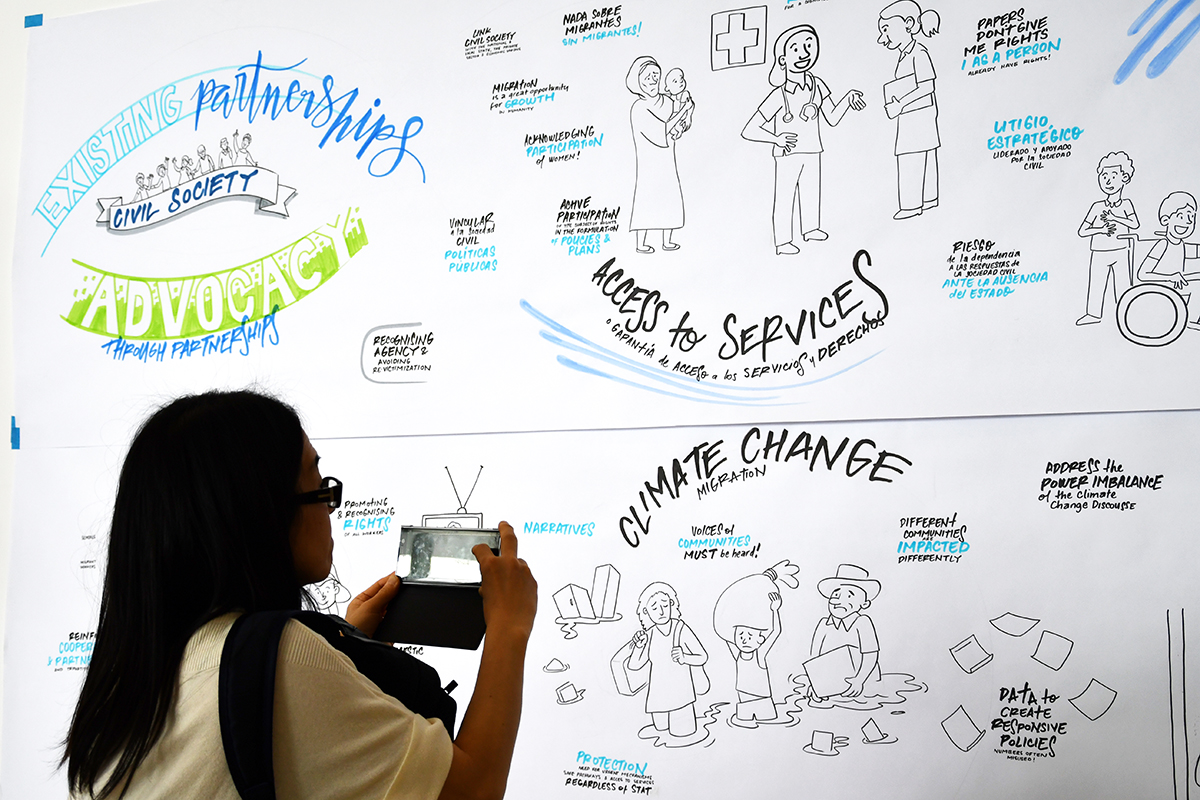With four intense days fully packed with panel discussions, bilateral exchanges, small-table conversations and coffee-break encounters, the annual Summit of the Global Forum on Migration and Development (GFMD) took place in Quito, Ecuador from 21-24 January.
Government officials, city mayors, business leaders, and civil society representatives met and deliberated both separately and at a day-long joint “common space.” Civil society Co-Chair Stella Opoku-Owusu challenged participants to keep the focus on the reality of migrants’ lives, to be visionary leaders, and to hold each other accountable.
Civil society Co-Chair José Dolores Suazo Mejía, better known as Don Lolo, added his personal experience of being a family member of a migrant tragically murdered along the Central American migration route. He urged participants not to close their eyes to the tragedies happening every day around us. He affirmed civil society’s commitment and willingness to sit together with governments, local authorities, and businesses to discuss how to improve migrants’ lives.
Some 200 civil society representatives from all regions of the world met at a Civil Society Day on Wednesday 22nd. They discussed five issues deemed most relevant at a time when the recently adopted Global Compact for Migration (GCM) needs to enter the implementation phase:
- access to services,
- mixed migration flows,
- labor migration,
- climate change-related displacement and
- criminalization of migrants and those who assist them.
Cross-cutting themes throughout the deliberations were the perspective of youth and children, a gender-sensitive lens, the contributions and inclusion of migrant diaspora communities, and countering negative narratives on migration.
Bram Frouws, from the Mixed Migration Centre, said that despite the many international commitments to improve life for migrants, the situation on the ground has not improved – in fact, in many cases, it has worsened. “We have a colossal task ahead of us as civil society organizations: to turn this trend around.”
After a day of discussions and deliberations, civil society leaders brought a series of thoughtful recommendations to the governments and business leaders gathered in the “common space,” following the five thematic priorities discussed above. The other GFMD mechanisms did not address two of these priorities: climate change-related displacement, and criminalization.
In this regard, civil society urged governments and other actors to engage in collective action to tackle the effects of climate change, which do not know any borders. They also highlighted the role of cities and local authorities in keeping migrants safe – and especially welcomed the institution of sanctuary cities, where migrants are not penalized because of their status (or lack thereof).
In a powerful message to the closing ceremony, Don Lolo shared his satisfaction with the outcomes of the past days. He welcomed the opportunity offered by the Forum for civil society representatives to sit at the same table with government representatives — as equals.
He concluded his intervention with a strong plea to all participants: “We want no more separated families, no more deaths in migration, no more violations of human rights!”
Now that the GFMD Quito Summit is over, what’s next? This year’s Civil Society Day theme points clearly in the direction of enriching partnerships for meaningful implementation of the GCM.
As Stéphane Jaquemet, ICMC Director of Policy and head of the GFMD Civil Society Coordinating Office, put it: “Implementation more than adoption is the real moment of truth.”

